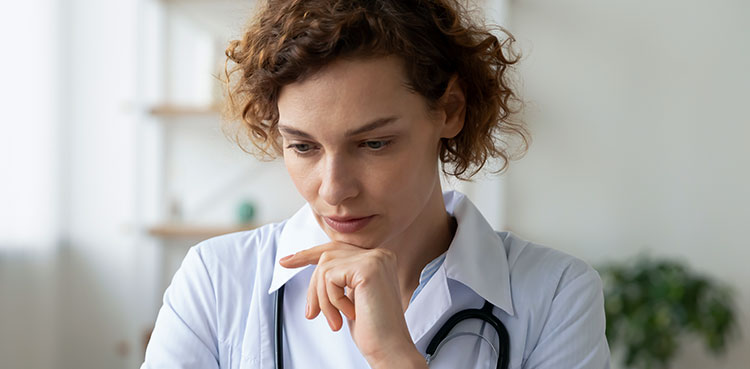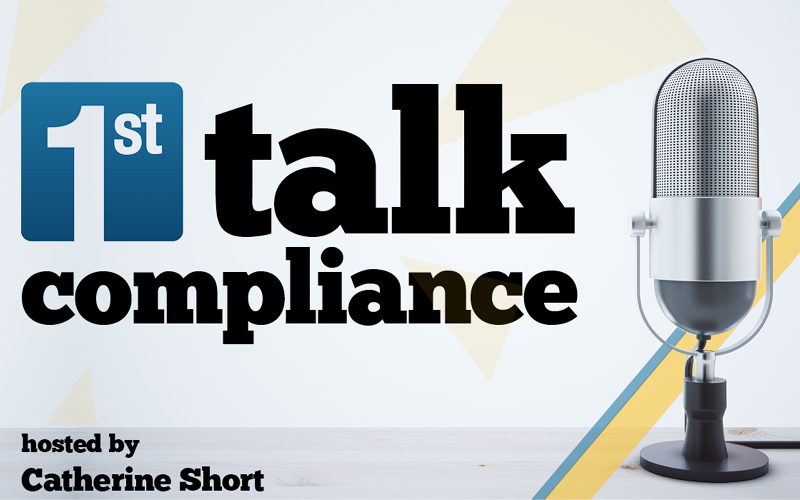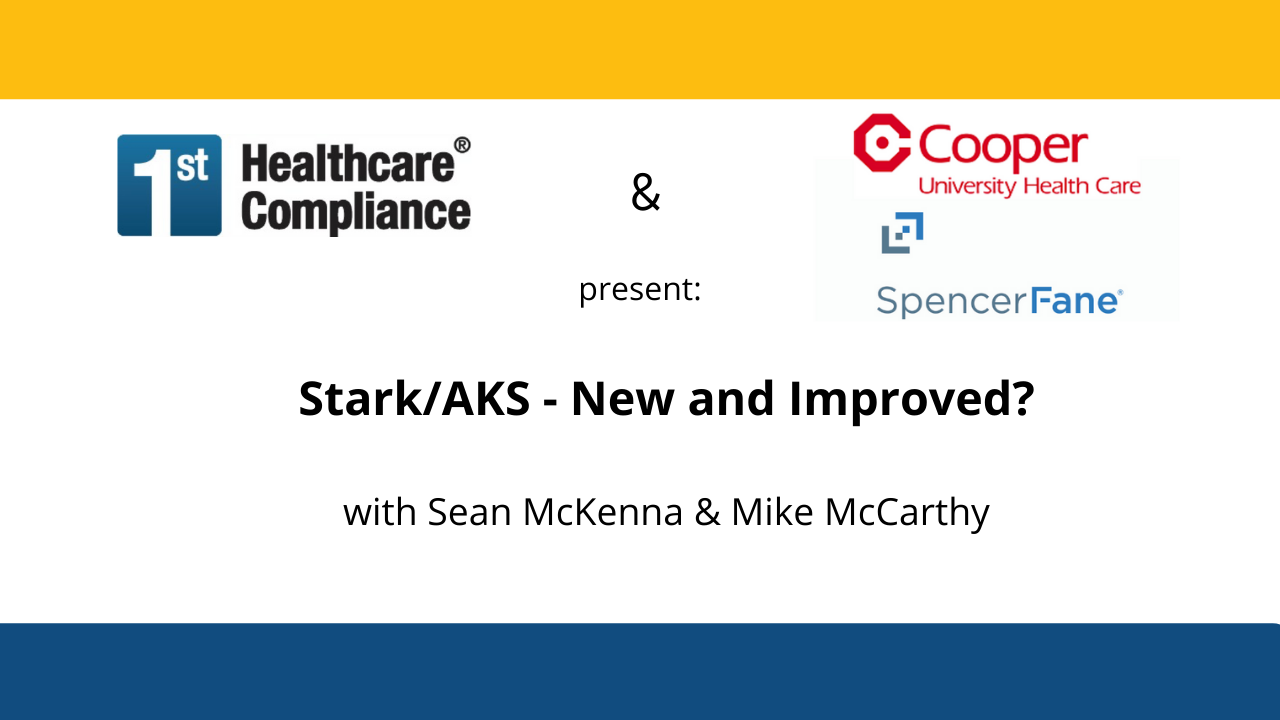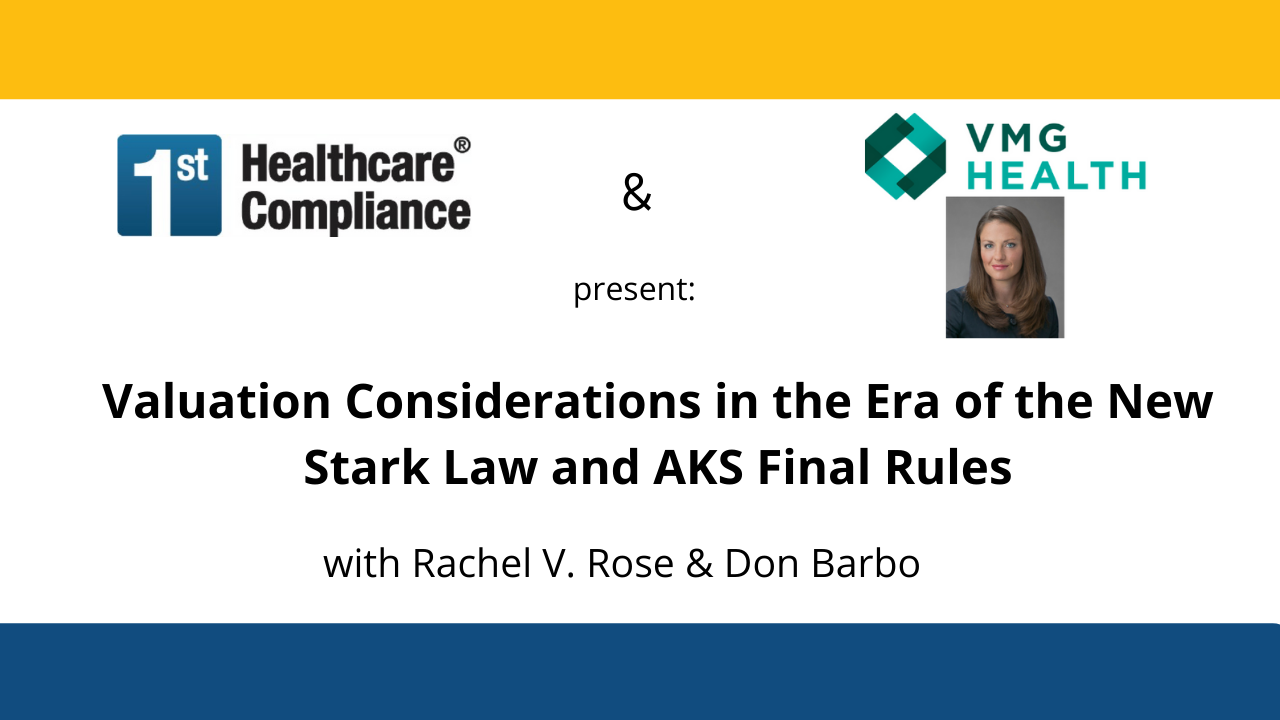Valuation Considerations in the Era of the New Stark Law and AKS Final Rules, Q & A with Rachel Rose and Don Barbo

Rachel V. Rose, JD, MBA, Principal with Rachel V. Rose – Attorney at Law, P.L.L.C. (Houston, TX) and Don Barbo, CPA/ABV, MBA, Managing Director with VMG Health will lead the complimentary webinar Valuation Considerations in the Era of the New Stark Law and AKS Final Rules on June 22, 2021, at 12 pm ET. This is a special 90-minute event that offers 1.5 CEUs. In anticipation of this webinar, Rachel and Don provide answers to common questions.
What was the driving force behind the changes found in the Stark Law and Anti-Kickback Statute (AKS) Final Rules?
The impetus behind the changes is primarily based on the shift in the laws and the industry towards value-based care and compensation models, which reward quality over quantity. Another reason is the coordination of patient care. These concepts are not new, as they were introduced over a decade ago with the passage of the Affordable Care Act. In order to achieve these policy goals, safe harbors needed to be added to the AKS and exceptions needed to be created for the Stark Law in order to avoid potential criminal and/or civil penalties.
Is there only one way to structure a Value-Based Enterprise (VBE) or is there flexibility?
No. The Final Rules state that there is flexibility in how a VBE is structured because of the different types and number of participants in any given VBE. There are some items that must be included in any value-based arrangement. For example, creating a governing document, listing the VBE participants, identifying a target population, and detailing the value-based purpose are some of the requisite items.
What is one key difference between the Stark Law Final Rule and the AKS Final Rule?
One of the most notable differences is the differing definition of a VBE participant between the Stark Law’s Final Rule and the AKS Final Rule. Under Stark, at §411.351, “VBE participant” is defined to mean a person or entity that engages in at least one value-based activity as part of a value-based enterprise. The definition of “VBE participant” finalized here does not exclude any specific persons, entities, or organizations from qualifying as a VBE participant.”
By way of contrast, the AKS Final Rule expressly identifies an “ineligible entity list” that includes the following persons, who may not be part of a VBE as a VBE participant:
- Pharmaceutical manufacturers, distributors, and wholesalers (referred to generally throughout this preamble as “pharmaceutical companies”);
- PBMs;
- Laboratory companies;
- Pharmacies that primarily compound drugs or primarily dispense compounded drugs (sometimes referred to generally in this rule as “compounding pharmacies”);
- Manufacturers of devices or medical supplies;
- Entities or individuals that sell DMEPOS, other than a pharmacy or a physician, provider, or other entity that primarily furnishes services, all of which remain eligible (referred to generally throughout this preamble as “DMEPOS companies”); and
- Medical device distributors or wholesalers that are not otherwise manufacturers of devices or medical supplies (for example, some physician-owned distributors).
How have these Final Rules impacted healthcare valuations in terms of fair market value and commercial reasonableness?
- In terms of fair market valuations:
- There are now separate and specific definitions of FMV and GMV for different types of valuation engagements (i.e. assets, real estate, equipment, and compensation arrangements).
- “Volume and value” has been separated and eliminated from the definition of FMV/GMV, and is now treated as a separate standard, in addition of FMV and CR, and not a component of FMV/GMV.
- In terms of commercial reasonableness:
- A statutory definition has now been created for commercial reasonableness, as follows:
Commercially reasonable means that the particular arrangement furthers a legitimate business purpose of the parties to the arrangement and is sensible, considering the characteristics of the parties, including their size, type, scope, and specialty. An arrangement may be commercially reasonable even if it does not result in profit for one or more of the parties. - Commentary within the Stark Rules & Regulations further explains, however, that “we are not convinced that the profitability of an arrangement is completely irrelevant or always unrelated to a determination of its commercial reasonableness…”; also, “The determination of commercial reasonableness is not one of valuation.”
- A statutory definition has now been created for commercial reasonableness, as follows:
Appreciating that either an internal event or an external event can change a valuation the day after it is done, what is considered industry practice for conducting property leases, equipment leases, and medical director or other employment contracts, which incorporate fair market value and commercially reasonableness?
The “shelf life” of a valuation can vary depending on a number of factors, including but not limited to changes related to the economic, regulatory, competitive, and market factors impacting the subject arrangement. The more volatile these factors are, the more likely that the valuation should be updated. Therefore, management should have a process in place in which these factors (among others) can be reasonably monitored, at least annually, to assess their impact on valuations. It is highly recommended that valuations be performed on new or renewed arrangements.
What are some healthcare compliance tips that can help persons reduce the risk of either government agency enforcement action and/or becoming a defendant in a False Claims Act case?
Depending on what facet of the Final Rules are being addressed, here are some general considerations:
- Make certain that all of the requirements of a VBE are met and monitored;
- If making a cyber donation, make sure that there is no exchange for “volume or value”, as well as a signed writing and other requisite items being adhered to;
- Read both laws in conjunction with each other and remember that the AKS is a criminal statute;
- Make sure that transactions involving physician compensation, real estate leases, and equipment leases comply with fair market value and commercial reasonableness; and
- Look at DOJ and agency guidance, as well as past enforcement actions as a guide post in what the government has considered and currently considers lawful or unlawful.
 Rachel V. Rose, JD, MBA, is a principal at Rachel V. Rose – Attorney at Law, PLLC (Houston, Texas), who advises clients on compliance, transactions, and litigation in healthcare, cybersecurity, corporate and securities, False Claims Act and Dodd-Frank whistleblower areas of law. She also teaches bioethics at Baylor College of Medicine in Houston. Rachel can be reached through her website, www.rvrose.com.
Rachel V. Rose, JD, MBA, is a principal at Rachel V. Rose – Attorney at Law, PLLC (Houston, Texas), who advises clients on compliance, transactions, and litigation in healthcare, cybersecurity, corporate and securities, False Claims Act and Dodd-Frank whistleblower areas of law. She also teaches bioethics at Baylor College of Medicine in Houston. Rachel can be reached through her website, www.rvrose.com.
 Don Barbo, CPA/ABV, MBA, is a Managing Director with VMG Health (Dallas, Texas) who specializes in healthcare business valuations and leads the firm’s litigation and disputes practice. Mr. Barbo has spoken extensively to various legal and valuation organizations and has published articles regarding business valuation issues. He also serves as an expert witness in litigated matters. Don can be reached through his email, don.barbo@vmghealth.com.
Don Barbo, CPA/ABV, MBA, is a Managing Director with VMG Health (Dallas, Texas) who specializes in healthcare business valuations and leads the firm’s litigation and disputes practice. Mr. Barbo has spoken extensively to various legal and valuation organizations and has published articles regarding business valuation issues. He also serves as an expert witness in litigated matters. Don can be reached through his email, don.barbo@vmghealth.com.
Be sure to register for this upcoming webinar on June 22 and listen to the podcast with Rachel on 1st Talk Compliance. Take a look at our book: HIPAA Privacy and Security, and our online compliance training courses such as What is HIPAA?, and HIPAA Business Associate Agreements Under HITECH. And check out Rachel’s other blogs Q&A: HIPAA Compliance for Business Associates, Q&A: HHS Final Rules, Patient Access to PHI & Health Apps Intersect, Recent HHS Guidance Underscores the Importance of HIPAA Compliance and Q&A: HIPAA and Health Apps.





